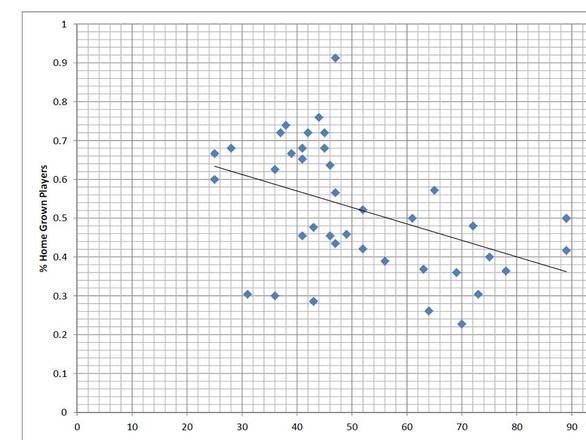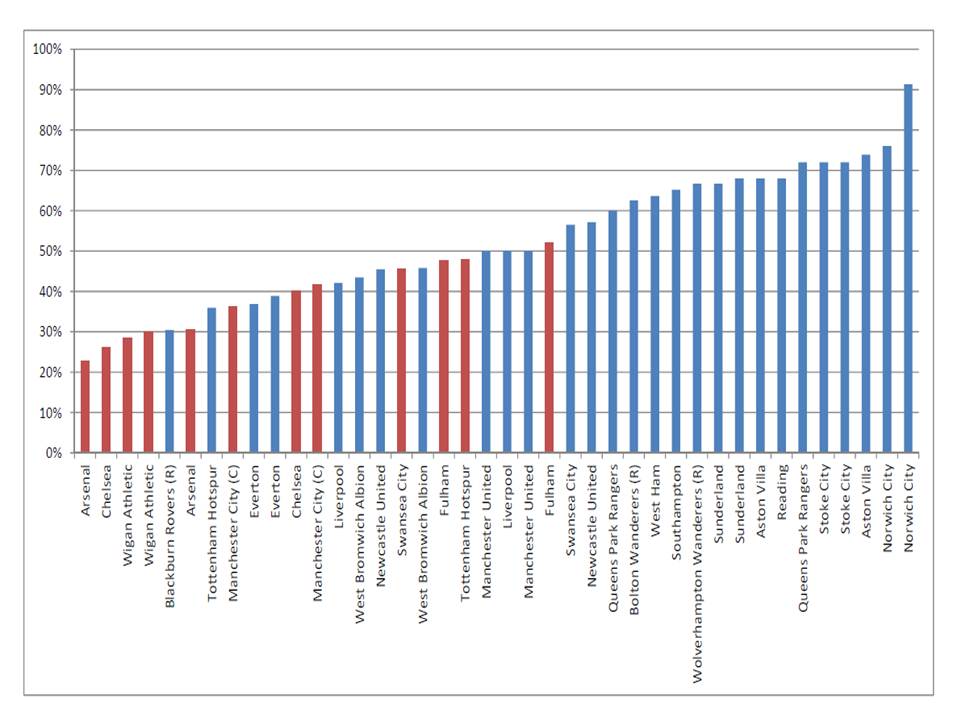
It seems the English league is suffering the same angst as the English electorate that results in protectionism and votes for the UK Independence Party.
The kernel of the argument over the number of foreign players in the Premier League is that it hampers the performance of the English national team. As Gary Neville put it:
Everyone who is supportive of the England national team will have grave concerns over the dwindling numbers of Premier League players that are British.
There are a few ways to come at this argument but it boils down to a protectionist argument with which economists will be very familiar. In fact one of the classic expressions (albeit satirical) of the protectionist approach was in Bastiat's Candlemakers' Petition in 1845. The Greg Dyke/Gary Neville argument seems to be "please keep out these foreign players because they are too good for our guys to get a run. If we could just get a run we'd be better players".
There has been a dramatic increase in the number of foreign players in the Premier League. This year there will be 450 players from outside Britain and Ireland in the Premier league compared to 13 in the inaugural season in 1992/3. Of course the claim that fewer foreign players would improve the performance of the English team begs the question why the English team performed so badly when there were very few foreign players in the top flight of English football.
Leaving aside that obvious flaw in the argument, there is a more fundamental flaw in the argument that clubs should increase the number of home grown players. That is that it is not any business of the clubs how the English team performs. They are answerable to their owners and perhaps to an extent their own fans, not the FA. Managers and clubs should field the strongest possible team they can and whether that includes 11 or no Englishmen can't be a consideration. A club manager will hardly be saved from the sack by leading a team of Englishmen to relegation. And it does seem that there is a relationship between league performance and the number of foreign players.
Each club is required to submit a squad of no more than 25 players, of which a maximum of 17 may be foreign, the balance must be 'home-grown'. A home grown player is one who has been registered with an English or Welsh club for 3 season before he is 21. The graph below shows the percentage of home grown players at the end of the September transfer window and the final points total for the last two full Premier League seasons. It shows a negative relationship between the percentage of home grown players and league performance. The percentage does not include under-21 players who may be entered in a separate list and do not have quotas attached. Also, there is no inference of causality. It is not clear whether better performance leads to less home grown players in the squad or fewer home grown players leads to better performance.
A second consideration in the number of non-home grown players may be the nationality of the manager of a club. A foreign manager may be more inclined to sign foreign players or to be more aware of foreign players that fit his system. Gary Neville hinted at this in a recent article. The graph below shows the percentage of home grown players for each club in the Premier League for the last two full seasons (so most clubs appear twice). The clubs in red had a foreign manager (meaning not British or Irish) at the start of that season (only one club switched from an English manager to a foreign manager between the two seasons - that was Tottenham Hotspur who appointed Andre Villas Boas to replace Harry Redknapp).
So the upshot is that if the FA wishes to limit foreign players it may be easier to do so by limiting foreign managers. Though why they would want to reduce the quality of their product that sells across the globe without any evidence that it might improve the national team performance is not clear to me. In fact, part of the success of the Premier League is due to it's popularity around the world and that is possibly due to the presence of players from around the
world.
The Premier League has benefited from globalisation. It would be retrograde to adopt a protectionist policy to player recruitment.


 RSS Feed
RSS Feed